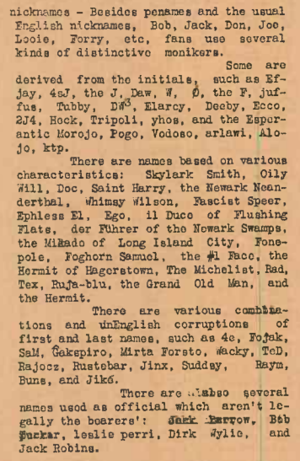Difference between revisions of "Nonstopparagraphing"
| Line 2: | Line 2: | ||
[[File:Nonstopparagrafing.PNG|thumb]] | [[File:Nonstopparagrafing.PNG|thumb]] | ||
{{fancy1|text= | {{fancy1|text= | ||
| − | and [[Fancyclopedia | + | and [[Fancyclopedia 1]] |
([[Ackerman]]) - Paragrafing in which no line is skipped between paragrafs, and the new paragraf is indented the length of the last line of the preceding one; in other words, when the typist reaches the end of a paragraf, he drops down a line, maybe hits the space bar once or twice, and goes on writing, as is done in this publication. | ([[Ackerman]]) - Paragrafing in which no line is skipped between paragrafs, and the new paragraf is indented the length of the last line of the preceding one; in other words, when the typist reaches the end of a paragraf, he drops down a line, maybe hits the space bar once or twice, and goes on writing, as is done in this publication. | ||
# | # | ||
| Line 10: | Line 10: | ||
(Annoyingly, while Fancy 1 does use nonstopparagraphing, ''the article on Nonstopparagraphing doesn't!'' so the image to the left which illustrates it well is the ''previous'' entry, on nicknames, which does.) | (Annoyingly, while Fancy 1 does use nonstopparagraphing, ''the article on Nonstopparagraphing doesn't!'' so the image to the left which illustrates it well is the ''previous'' entry, on nicknames, which does.) | ||
| + | {{fancy1|text= | ||
| + | and [[Fancyclopedia 2]] | ||
| + | Paragraphing in which no line is skipped between paragraphs, and the new paragraph is indented the length of the last line of the preceding paragraph. That sounds complicated, but isn't. | ||
| + | # | ||
| + | When the typist reaches the end of a paragraph he drops down a line, maybe hits the space bar a time or two, and then goes on writing as is done here. If the paragraph happens to end flush with the right-hand margin, as ours did, Speer recommends the use of a # mark typewriterese for ¶) to create a new fractional line; Ackerman skips a line and indents five spaces as with the beginning of conventional paragraphing. The system flourished mightily in [[Third Fandom]] and is still popular. | ||
| + | }} | ||
------ | ------ | ||
Comment from [[Ned Brooks]] - 9/1/08 10:13 AM | Comment from [[Ned Brooks]] - 9/1/08 10:13 AM | ||
| Line 16: | Line 22: | ||
{{publishing}} | {{publishing}} | ||
| + | [[Category:fancy1]] | ||
[[Category:fancy2]] | [[Category:fancy2]] | ||
Revision as of 13:18, 21 August 2020
Once popular in fanzines, now seldom seen; instead of indenting five spaces for each paragraph, the first paragraph begins flush left, the following paragraph begins one line down and two spaces past the last character in the last line of the preceding paragraph.
| From Fancyclopedia 1, ca. 1944 |
| and Fancyclopedia 1
(Ackerman) - Paragrafing in which no line is skipped between paragrafs, and the new paragraf is indented the length of the last line of the preceding one; in other words, when the typist reaches the end of a paragraf, he drops down a line, maybe hits the space bar once or twice, and goes on writing, as is done in this publication. Practice varies on what to do in a case like that, where a paragraf ends flush with the right-hand margin. Ackerman skips a line and indents five spaces; Speer doesn’t like that because the skip-a-line paragrafing should mean a greater break than usual in the discussion, and he tries to avoid ending a paragraf at the rh margin; if it does happen, he uses a # mark (typewriterese for ¶) to make a new fractional line. |
(Annoyingly, while Fancy 1 does use nonstopparagraphing, the article on Nonstopparagraphing doesn't! so the image to the left which illustrates it well is the previous entry, on nicknames, which does.)
| From Fancyclopedia 1, ca. 1944 |
| and Fancyclopedia 2
Paragraphing in which no line is skipped between paragraphs, and the new paragraph is indented the length of the last line of the preceding paragraph. That sounds complicated, but isn't. When the typist reaches the end of a paragraph he drops down a line, maybe hits the space bar a time or two, and then goes on writing as is done here. If the paragraph happens to end flush with the right-hand margin, as ours did, Speer recommends the use of a # mark typewriterese for ¶) to create a new fractional line; Ackerman skips a line and indents five spaces as with the beginning of conventional paragraphing. The system flourished mightily in Third Fandom and is still popular. |
Comment from Ned Brooks - 9/1/08 10:13 AM
I did nonstopparagraphing for years when cutting mimeo stencils on a typewriter - it's quite natural there. I could do it fairly easily in the long-obsolete computer typesetter I still use - perhaps I will.... FancyFont allows the position along a line to be remembered for reuse, so that with the addition of "\m1" at the end of a paragraph, and then "\hm1" at the beginning of the new paragraph, the exact same effect would be achieved.
| Publishing |
